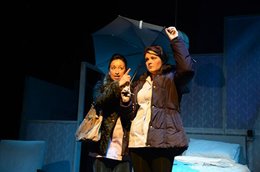“Wiping piss and shit up for £6 an hour”. That bluntly summarises the job description of Frances and Loretta, the community care workers in Fly Me To The Moon, a new two-hander by Marie Jones which also marks her debut as a stage director. Jones doesn’t explicitly offer the paltry wages that the women earn as an excuse for the “runaway train” (as she puts it) of financial legerdemain and deception they become embroiled in when their elderly patient Davy dies. But it’s certainly there in the background as an extenuating factor, and emphasised in a tendentious and mildly politicised note on social care policy in the programme.
.jpg.aspx%3Fwidth=260&height=172) That is, however, pretty much lecture over, for Jones is anything but a didactic playwright. “I’m there to entertain people”, she says, and entertain them she undoubtedly does in this expanded re-write of a one-act originally commissioned by Paines Plough for their “A Play, a Pie and a Pint” project two years ago. Although Fly Me has many of the technical accoutrements of French farce (vertiginous pacing, improbable coincidences, events spiralling uncontrollably from relatively innocent beginnings), much of the humour is actually located in the dialogue of Frances and Loretta, rendered by Jones with a microscopically accurate ear for the vibrant speech patterns of working-class Belfast.
That is, however, pretty much lecture over, for Jones is anything but a didactic playwright. “I’m there to entertain people”, she says, and entertain them she undoubtedly does in this expanded re-write of a one-act originally commissioned by Paines Plough for their “A Play, a Pie and a Pint” project two years ago. Although Fly Me has many of the technical accoutrements of French farce (vertiginous pacing, improbable coincidences, events spiralling uncontrollably from relatively innocent beginnings), much of the humour is actually located in the dialogue of Frances and Loretta, rendered by Jones with a microscopically accurate ear for the vibrant speech patterns of working-class Belfast.
Katie Tumelty’s Frances is the more scheming and calculating of the two women, inveigling the initially ingenuous Loretta of Tara Lynne O’Neill into drawing Davy’s weekly pension from an ATM before reporting that they’ve found him dead in his bathroom, then cashing in a bookie’s docket for the pensioner’s £500 winnings on a horse called Fly Me To The Moon (Davy’s a big fan of Sinatra). “It’s what he would have wanted”, explains Frances, whose co-worker capitulates easily – she’s struggling to support a child at grammar school, and needs the money to pay for an excursion.
It would be difficult to imagine these parts being acted significantly better. Tumelty and O’Neill both show a complete identification with the idiom and mercurial thought processes of these working-class Belfast women, in a script which is formidably well crafted and modulated: it bristles with the type of jagged, sharp-edged wordplay which is the care workers’ natural response to the straitened environment they live in, and their daily defence against it.
Jones frames the action with a flashback mechanism implying that the two women later stand trial for their deceptions. Occasionally they slip from stage time into a past-tense narrative, a shift of perspective half-heartedly underscored by anodyne blue-rinse lighting. This adds little to the action, and is the only time in the evening when the acting seems less than totally convincing. Jones’ direction is otherwise unfussily effective: she devised the play in collaboration with Tumelty and O’Neill, and this shows in the seamless elision between text and actresses achieved in this production.
 Niall Rea’s bed-sit set is effectively telescoped to combine sightlines to the bathroom door behind which Davy has his fatal seizure before the action commences, and the kitchenette where his meals-on-wheels are delivered for consumption. It’s a small world, made somehow bigger and more significant when, at the play’s conclusion, Davy’s will is discovered in a little wooden chest beneath his single bed, along with a selection of old photos. For a moment, however briefly, the pathway of a busy life leading to this essentially lonely, tragi-comic demise is thoughtfully illuminated.
Niall Rea’s bed-sit set is effectively telescoped to combine sightlines to the bathroom door behind which Davy has his fatal seizure before the action commences, and the kitchenette where his meals-on-wheels are delivered for consumption. It’s a small world, made somehow bigger and more significant when, at the play’s conclusion, Davy’s will is discovered in a little wooden chest beneath his single bed, along with a selection of old photos. For a moment, however briefly, the pathway of a busy life leading to this essentially lonely, tragi-comic demise is thoughtfully illuminated.
There’s a darker moment, too, when Loretta’s defences crumble as she describes the “shadow of a man” her husband has become since succumbing to unemployment. Tellingly, her co-worker doesn’t want to listen. “I get it, I get it”, is Frances’s curt response, as she dismissively waves away further details. Is she insensitive? No. This is, Jones implies, a world in which misfortune weighs heavily enough on individual characters without being permitted to wreak additional havoc on others through dissemination by language.
Beside plays such as Jones’s phenomenally popular Stones in His Pockets (soon to be filmed) and A Night in November, Fly Me To The Moon has the feeling of a chamber piece. There's no point looking for enduring profundities in it, because there aren't any. What you get is lots of laughter, wry insights into the vagaries of our socio-economic system, and an invigoratingly humane sense of engagement with some of its least advantaged citizens. These things Marie Jones is very good at, and her many fans will certainly not be disappointed.
Terry Blain is an arts journalist and cultural commentator, contributing regularly to BBC Music Magazine, Opera Britannia, Culture Northern Ireland and other publications.